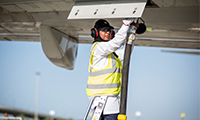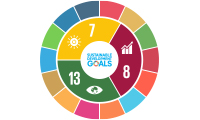Water use
Few natural resources are as essential as fresh water and its importance will only rise as the world’s population increases and developing economies continue to grow. The availability of fresh water is a growing challenge in some parts of the world, as it is not always available where people need it or in a form that is easy to use.
We carefully manage our water use and discharges. We design and operate our facilities to help reduce fresh water use, and we tailor our use of fresh water to local conditions because water constraints affect people at the local or regional level.
Water use
Assessing water constraints
Our environmental, social and health impact assessments help us to better understand the water risks for our projects and broader watershed impacts. We evaluate the long-term sustainability of water resources to select the option that avoids or minimises disruption to the environment and other users.
We assess risks based on water availability, quality and accessibility. To help us define water stress conditions, we use a combination of publicly available water stress tools, such as the World Resources Institute’s Aqueduct Water Risk Atlas, and information specific to the local environment.
In water-scarce areas, we develop water management plans for our facilities. These plans describe the long-term risks to water availability and define measures to minimise our use of fresh water or recommend alternatives, such as recycled water, processed sewage water and desalinated water.
For example, in 2018, Shell affiliate QGC Pty Limited's natural gas project in Queensland, Australia, continued to conduct research into groundwater-dependent ecosystems in the Surat Basin. We want to determine the impact of water use in areas where surface water is absent for large parts of the year and where ecosystems are dependent on groundwater. We have a robust monitoring programme with response plans in place to identify and mitigate any impacts from our operations.
Read more at www.shell.com/water-use.
Fresh water use performance
In 2018, our intake of fresh water was 199 million cubic metres, about the same as 2017. Around 90% of our fresh water intake was used for refining oil products and chemicals, with the balance mainly consumed in oil and gas production. Around 40% of fresh water intake was from public utilities such as municipal water supplies.
Fresh water withdrawn and consumed
million cubic metres
Enlarge imageFresh water withdrawn by business
million cubic metres
Enlarge imageThe volume of fresh water withdrawn by our Downstream business increased in 2017 and 2018, due primarily to the inclusion of two refineries previously operated by the Motiva joint venture in the USA in our data from May 2017. This increase was partly offset by the exclusion of oil sands when operatorship was transferred to another company, Canadian Natural, in 2017 (oil sands data are included in Others in the graph).
Waste water and produced water
We develop technologies to treat, reuse and recycle water from our operations so that we can manage our water footprint in a responsible way while meeting environmental standards. Where appropriate, we look for ways to treat water from our operations using natural solutions such as constructed wetlands.
We have worked for several years to improve water management at our unconventional projects. For example, SWEPI LP – a subsidiary of Shell Oil Company – at its operation in Appalachia, USA, shares produced water with other operators in the region so it can be reused, thereby minimising disposal of waste water.
At the Groundbirch shale gas project near Fort St. John, Canada, we minimise the use of fresh water by storing, recycling and reusing produced water. However, the asset still has excess waste water in the system that needs to be managed responsibly. In 2018, we started testing a new technology unit which enables us to dehydrate waste water at the point of creation and evaporate clean water back to the atmosphere, reducing waste water volumes for disposal.
We track low-level concentrations of oil, grease and other hydrocarbons within water returned to the environment from the day-to-day running of our facilities (collectively referred to as “discharges to surface water”). We work to minimise these discharges in line with regulatory requirements and our own standards to reduce the potential for environmental impacts on local water quality. In 2018, the combined total hydrocarbons discharged to surface water from our facilities was 1.4 thousand tonnes, up from 1.2 thousand tonnes in 2017. This was mainly due to changes in how we collect and analyse samples and calculate the amount of oil discharged to water at our Pulau Bukom site in Singapore.
Working with others
We support open innovation and work closely with organisations, such as the World Business Council for Sustainable Development (WBCSD) and IPIECA, the global oil and gas industry association for environmental and social issues.
In 2018, Shell led the development of water horizon scanning through IPIECA’s Water Working Group. As water trends, regulation and policy advance, it is important that IPIECA tracks these trends proactively to allow members to plan for the future.
Shell is a member of the Water Nexus consortium in the Netherlands, a collaboration between universities, government bodies and industry. The consortium supports research on innovative approaches to secure water supply essential for domestic, industrial and agricultural use, such as green infrastructure and the use of saline water instead of fresh water.
Soil and groundwater
We assess and carefully manage the risks of potential soil and groundwater contamination. We conduct scientific research on the behaviour and potential risks of contamination from petroleum activities and share our findings with government agencies, researchers and other stakeholders to support the development of environmental guidelines.
Soil and groundwater remediation is designed to mitigate risks to health and the environment, but can also generate its own environmental, social and economic impacts. We believe remediation activities can be made more sustainable and have co-authored the first ISO Standard on Sustainable Remediation. We have started to apply the approach in our own soil and groundwater projects.
 Our people
Our people
 Sustainable development goals
Sustainable development goals
 About our data
About our data
 Electricity
Electricity